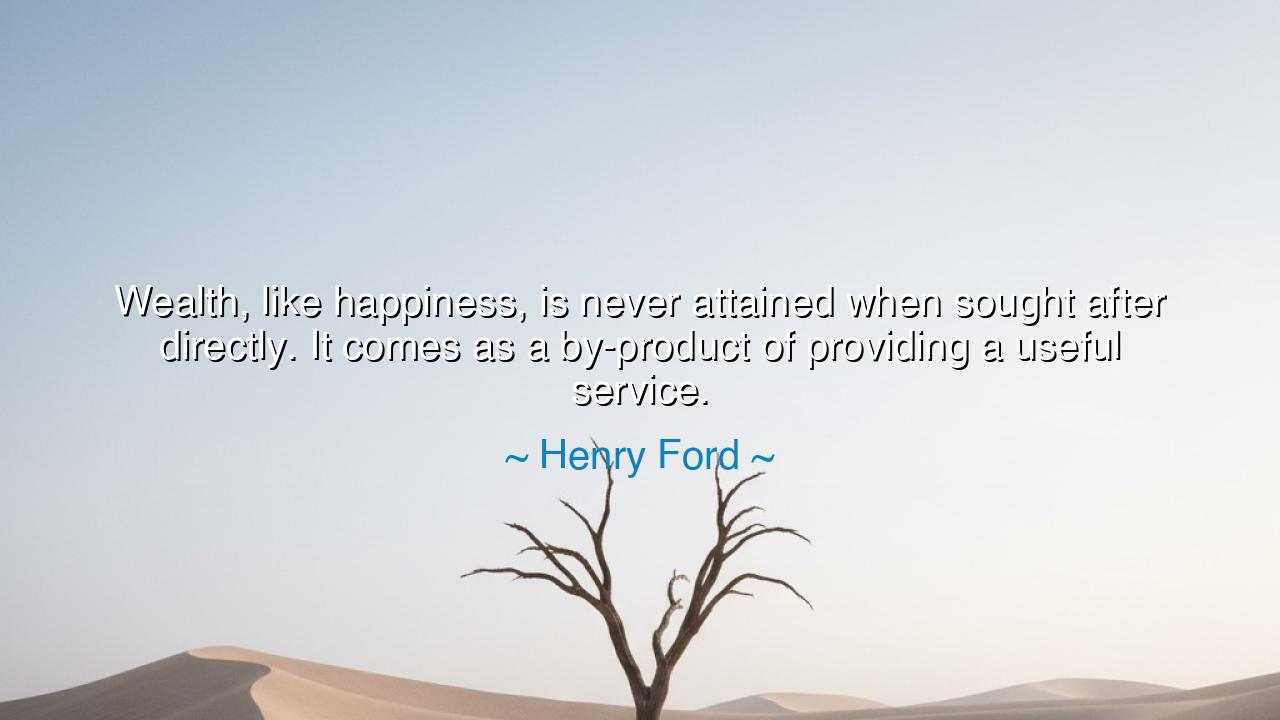
Wealth, like happiness, is never attained when sought after
Wealth, like happiness, is never attained when sought after directly. It comes as a by-product of providing a useful service.






In the words of Henry Ford, “Wealth, like happiness, is never attained when sought after directly. It comes as a by-product of providing a useful service,” we find not merely the wisdom of an industrialist, but the timeless truth of the universe itself — that true abundance flows not from desire, but from purpose. Ford, the great maker of machines and architect of modern industry, spoke these words not as a philosopher in leisure, but as a worker who built empires from vision and toil. He understood that wealth, like happiness, flees from those who chase it for its own sake, yet rewards those who serve others with sincerity and skill.
The origin of this truth lies in the very life of Henry Ford himself. In his early years, he was not driven by gold but by the dream of making the automobile accessible to the common man. In an age when cars were toys for the rich, Ford sought to bring mobility, freedom, and dignity to every household. His focus was not profit, but service — not luxury, but usefulness. And from this devotion arose an empire, not built by greed but by generosity of vision. His assembly lines transformed labor, his prices transformed access, and his ideas transformed society. Thus, wealth came not as the goal, but as the echo of his service to humanity.
To the ancients, this principle was already known. The philosopher Aristotle taught that happiness — eudaimonia — was not a treasure to be grasped, but the natural fruit of a life lived in virtue and purpose. Likewise, wealth was seen not as an end, but as the servant of good works. When man seeks riches only for himself, he enslaves his spirit to endless hunger; but when he works to fulfill a greater need, the world itself becomes his ally. For the universe rewards those whose labor enriches life — not those who hoard, but those who create.
Consider the story of Andrew Carnegie, the steel magnate who rose from poverty in 19th-century America. Carnegie did not begin with a lust for gold, but with a hunger to learn, to build, to improve. His factories forged not only steel, but progress. And when his wealth finally came — immense beyond measure — he turned it back to the people, building libraries, universities, and institutions of knowledge. In doing so, he proved Ford’s words true: wealth that is earned through service is wealth that serves beyond its owner. It uplifts generations.
Happiness, too, obeys the same law. Those who chase pleasure find it fleeting, but those who live for meaning find joy in every breath. The farmer who feeds, the teacher who enlightens, the healer who restores — these do not seek happiness, yet they find it in the giving of themselves. For both happiness and wealth are reflections, not possessions; they mirror the goodness of one’s deeds. They cannot be grasped directly, for they bloom naturally in the soil of purpose.
This is the wisdom that Ford offers to all who labor: do not set your heart upon the reward, but upon the work. Do not ask, “What shall I gain?” but, “Whom shall I serve?” Every act done with honesty and usefulness plants a seed that the world will one day repay a hundredfold. Wealth is the shadow that follows effort when the light of service shines. Those who chase the shadow will lose it; those who walk toward the light will see it follow them faithfully.
Let this then be the lesson passed down to the generations: seek to be of use. Build something that makes life better. Give what is in your hands, whether it be strength, wisdom, or compassion. The river of wealth flows toward those who dig channels of service; the flame of happiness warms those who give light to others. Do not labor for riches or comfort alone, for these are fragile; labor instead for purpose, and riches will come as dust upon your sandals.
So remember, O seeker of fortune: the hands that create for others are never empty. Wealth and happiness will find you not when you hunt them, but when you forget yourself in the joy of doing good. As Henry Ford proved, the truest prosperity is not in what one takes from the world, but in what one gives to it — and from that giving flows the boundless abundance of life itself.






AAdministratorAdministrator
Welcome, honored guests. Please leave a comment, we will respond soon